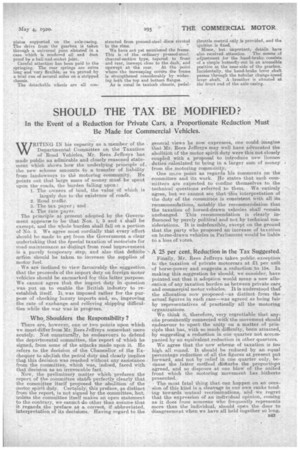SHOULD THE TAX BE MODIFIED?
Page 19

If you've noticed an error in this article please click here to report it so we can fix it.
In the Event of a Reduction for Private Cars, a Proportionate Reduction Must Be Made for Commercial Vehicles.
WRITING IN his capacity as a member of the Departmental Committee on the Taxation of Road Vehicles, Mr. Rees Jeffreys has made public all admirable and closely reasoned statement which shows how the underlying principle of, the new scheme amounts to a transfer of liability from landowners to the' motoring community. He points out that large sums of money musf be spent upon the roads, the burden falling upon : 1. The owners of land, the value . of which is largely due to 'the existence of roads, 2. Road traffic.
3. The tax payer ; and 4. The rate payer. The principle at present adopted by the Government appears, to be that Nos. 1, 3 and 4 shall be exempt, and the whole burden shall fall on a portion of No, 2. We agree most cordially that every effort should be inade to get from the Government a clear .undertaking that the dpecial taxation of motorists for road maintenance as distinct from road improveffient is a purely temporary step, and also that definite aiefion should be taken toincrease the supplies of motor fuel. . .
We are inclined to view .favourably the suggestion that the proceeds of the import duty on foreign motor vehicles should be earmarked for this latter purpose. We cannot agree that the import duty in question was put on to enable the British industry to reestablish itself. It was imposed rather for the purpose of checking luxury imports and, so, improving the rate of exchange and relieving shipping difficulties while the war was in propess.
Who, Shoulders the Responsibility ?
There are, however, one or two points upon which we must differ from-Mr. Rees Jeffreys somewhat more acutely. Not unnaturally, he endeavours to defend the departmental committee, the report of which he signed, from some of the attacks made upon it. He refers to the decision of the Chancellor. of the Exchequer to abolish the petrol duty and clearly implies that this decision was reached without any assistance from the committee, which was, indeed, faced with that decision as an irrevocable fact.
Now, the preliminary matter which prefaces the report of the committee states perfectly -clearly that the committee itself proposed the abolition of the motor spirit duty. Certainly, this preface, as distinct from the report, is not signed by the committee, but, unless the committee itself makes an open statement to the contrary, we cannot do other than assume that it regards the preface as a correct if abbreviated, interpretation of its decisions. Having regard to the general views he now expresses, one could imagine that Nir. Rees Jeffreys may well have advocated the abolition of the motor spirit duty were this not closely coupled with a proposal to introduce new licence duties calculated to bring in a larger sum of money from the motoring oonominity.
One more point as regards his emninents on the committee and its work. He states that such committees are expected to confine themselves to the technical questions referred to them. • We entirely agree, but we cannot see that this interpretation of the duty of the committee is consistent with all its recommendations,' notably the recommendation that the taxation of horsed-drawn vehicles shall remain unchanged. This recommendation is clearly influenced by purely political and not by technical considerations. It is indefensible, except on the ground that the party who proposed an increase of taxation on horse-drawn vehicles in Parliament would be liable to a loss of vote's.
A 25 per cent. Reduction in the Tax Suggested. Finally, Mr. kees Jeffreys -takes public, exception. to the taxation of private motorcars at 21 per unit of horse-power and suggests a reduction to. lbs. In making this _suggestion he should, we consider, have • pointed out that it adoption would mean a new aliocaticu of any taxation burden as between private cars and commercial motor vehicles. It is understood that the allocation now proposed—as distinct from the actual figures in each ease—was agreed as being fair by representatives of practically all the motoring organizations.
We think it, therefore, very regrettable that aoy, oTie prominently connected. with the movement should endeavour to upset the unity on a matter or principle that has, with so much difficulty, been attained, by suggesting a reduction in one quarter not aocompanied by an equivalent reduction in other quarters.
We agree that the new scheme of taxation is too high all round. It should be reduced by an equal percentage reduction of all the figures at present put forward, and not by relief in one quarter only, beoause the latter method disturbs the proportiops agreed, a-nd so disposes at one blow of the united front which the motoring Movement has_ hitherto presented.
The most fatal thing that can happen on an occasion of this kind is .a cleavage in our own ranks tending towards -mutual recriminations, and -we, regret that the expression of an individual opinion, coming as it does from someone who frequently represents more than the individual, should open 'the door to disagreement when we have all held together so long. n43




























